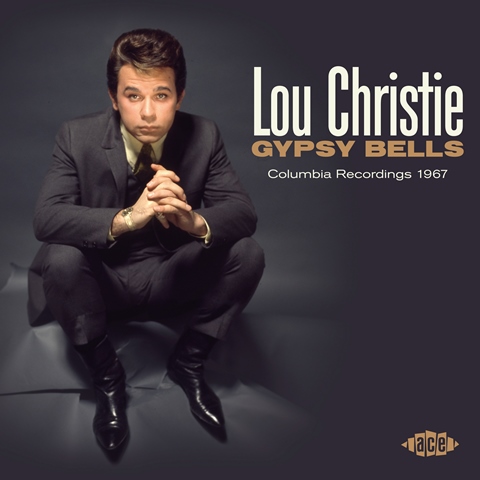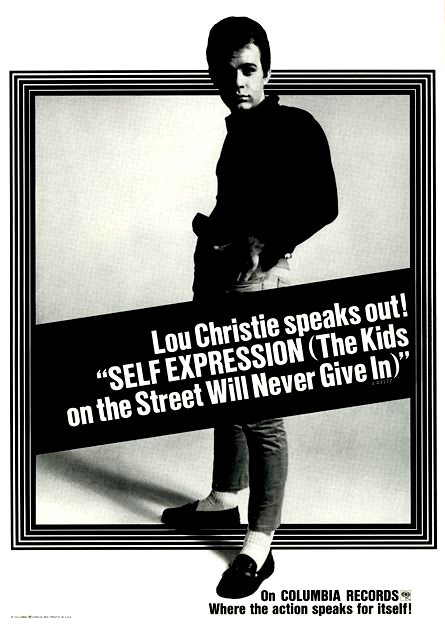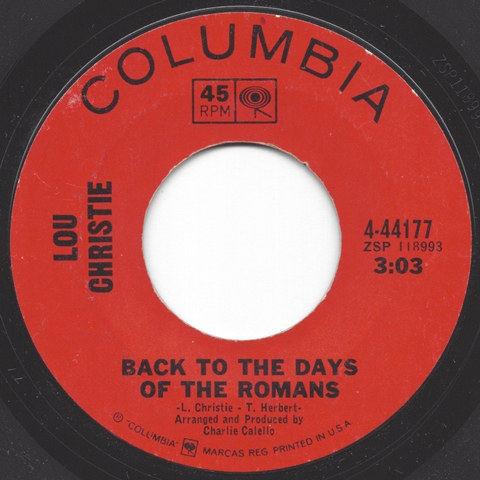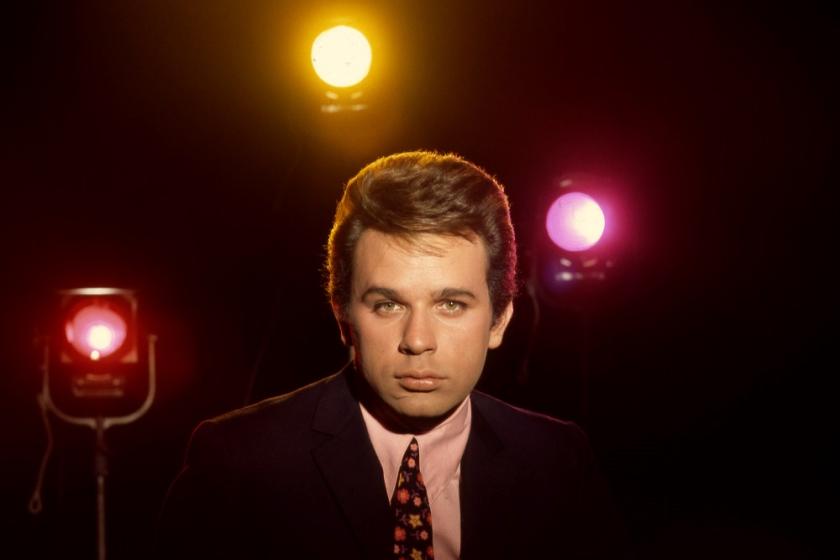Lou Christie fancied offering some social comment. The lyrics of his May 1967 single “Self Expression (The Kids on the Street Will Never Give in)” tackled inter-generational conflict: “Papa I don't see things your way, Like choosin' my own religion, Like where I hang out's my decision, Self-expression all the way.”
On the flip, the mind-blowing “Back to the Days of the Romans” observed a society in decline. “We're repeating Roman history,” sang Christie with gusto. “On the streets where kicks are our beat, It's a tortured way of livin', It's not a new bag, Letting your conscience sag, The Romans did it.” How to reverse this disintegration? “Old fashioned moon love.” Revealing the means of salvation was followed by an exhortation to “Sing hallelujah, sing hallelujah.” It's one of the most amazing single sides of the Sixties.
 Clearly, Christie wasn’t entirely serious with either song but the times were a-changin’ and he felt the need to make a statement. What wasn’t changing was the nature of his music and voice. He still employed the falsetto which took “Lightnin’ Strikes” to the top of the US charts in early 1966. He still cleaved to doo-wop as the foundation of his music. Not so far then from The Four Seasons, who also continued to thrive after The Beatles supposedly reduced to close-to-zero the chances for early Sixties-rooted US pop to score in the wake of their Stateside arrival. “Lightnin’ Strikes” had been a hit on MGM and, in February 1967, he signed with Columbia. The “Self Expression”/“…Romans” single was the second of four he released for the label.
Clearly, Christie wasn’t entirely serious with either song but the times were a-changin’ and he felt the need to make a statement. What wasn’t changing was the nature of his music and voice. He still employed the falsetto which took “Lightnin’ Strikes” to the top of the US charts in early 1966. He still cleaved to doo-wop as the foundation of his music. Not so far then from The Four Seasons, who also continued to thrive after The Beatles supposedly reduced to close-to-zero the chances for early Sixties-rooted US pop to score in the wake of their Stateside arrival. “Lightnin’ Strikes” had been a hit on MGM and, in February 1967, he signed with Columbia. The “Self Expression”/“…Romans” single was the second of four he released for the label.
His stay at Columbia ought to have gone swimmingly. Lou Christie was a hit-maker. “Lightnin’ Strikes” was followed, on MGM, into the charts by “Rhapsody in the Rain.” In 1969 “I’m Gonna Make You Mine,” on Buddah, was a smash. The through-line of Top 40 success, which began in early 1963 with “The Gypsy Cried,” should have been unbroken. But it was not. The stay at Columbia brought no hits.
 The first single for the new label was March 1967’s “Shake Hands and Walk Away Cryin'.” It was marvellous, and just enough like “Lightin'’ Strikes” without being too similar. Its B-side was the gorgeous, swinging, supper-club fantasia “Escape.” After “Self Expression”/“…Romans”, the third Columbia single was July’s “Gina,” a more subtle song and performance which, again, failed to chart nationally (“Escape” was reused as its B-side). Next and last was October’s “Don't Stop Me (Jump Off The Edge Of Love)” (“Back to the Days of the Romans” was recycled as its B-side). Lou Christie left Columbia in May 1968. In total, the label had released six tracks.
The first single for the new label was March 1967’s “Shake Hands and Walk Away Cryin'.” It was marvellous, and just enough like “Lightin'’ Strikes” without being too similar. Its B-side was the gorgeous, swinging, supper-club fantasia “Escape.” After “Self Expression”/“…Romans”, the third Columbia single was July’s “Gina,” a more subtle song and performance which, again, failed to chart nationally (“Escape” was reused as its B-side). Next and last was October’s “Don't Stop Me (Jump Off The Edge Of Love)” (“Back to the Days of the Romans” was recycled as its B-side). Lou Christie left Columbia in May 1968. In total, the label had released six tracks.
What’s missing from this sketch is the material he recorded for Columbia which wasn’t issued. The important Gypsy Bells - Columbia Recordings 1967 plugs this gap. Its booklet includes an essay from Saint Etienne's Bob Stanley and track-by-track annotation by Lou Christie expert Harry Young. The six tracks from the singles are present: firstly in mono as per what was issued, and (for five of them) in stereo too. Also here are 13 tracks which have never been released before, all recorded between February and November 1967. The implication is that Columbia were thinking of a Lou Christie album but went cold on the idea after the singles failed to click nationally. Considering the amount of niche albums major labels issued in the psychedelic/hippie era, it is surprising they did not put something out. In July 1968, Columbia released the Present Tense album credited to Sagittarius – wonderful, but hardly a seller.
 Based on Gypsy Bells, a 1967 Lou Christie album would also have been wonderful. “Tender Loving Care” is an irresistible Motown tribute where Christie sings ”Berry Gordy and the elegant Supremes are taking over Detroit City.” “The Greatest Show on Earth” simply sounds like a hit single. As does the propulsive "Yellow Lights Say.” “Standing on my Promises” has a little bit of Pet Sounds Brian Wilson in there and would have made the fine closer of a putative album. It goes on. Even though some of the previously unheard tracks are unfinished as complete arrangements were not recorded, everything is fully formed and accessible.
Based on Gypsy Bells, a 1967 Lou Christie album would also have been wonderful. “Tender Loving Care” is an irresistible Motown tribute where Christie sings ”Berry Gordy and the elegant Supremes are taking over Detroit City.” “The Greatest Show on Earth” simply sounds like a hit single. As does the propulsive "Yellow Lights Say.” “Standing on my Promises” has a little bit of Pet Sounds Brian Wilson in there and would have made the fine closer of a putative album. It goes on. Even though some of the previously unheard tracks are unfinished as complete arrangements were not recorded, everything is fully formed and accessible.
But there it was. Columbia and Lou Christie, it seems, were not made for each other. Nonetheless Charles Calello, who produced and arranged most of these tracks – he had earlier worked with Christie for MGM records – remained on Columbia’s books to produce Laura Nyro’s March 1968 Eli And The Thirteenth Confession album. Here, a distinct artistic through-line was apparent.
Still, Lou Christie picked himself up, put Columbia behind him, signed to Buddah records in July 1968 and was in the Top Ten the next year with “I’m Gonna Make You Mine.” His new label allowed him to make the album he wanted to make, and the staggering, Americana-inclined eco-concept album Paint America Love arrived in 1971. Post-Columbia, it didn’t turn out badly but, finally, with the astonishing Gypsy Bells - Columbia Recordings 1967 it is possible to understand the full story of Lou Christie’s 1967. Social comment, it is belatedly revealed, was a small piece of the jig-saw.
- Next week: Blank Generation - A Story Of US / Canadian Punk and its Aftershocks 1975-1981 and Just Want To Be Myself - UK Punk Rock 1977-1979 revisit exactly what they say
- More reissue reviews on theartsdesk
- Kieron Tyler’s website















Add comment